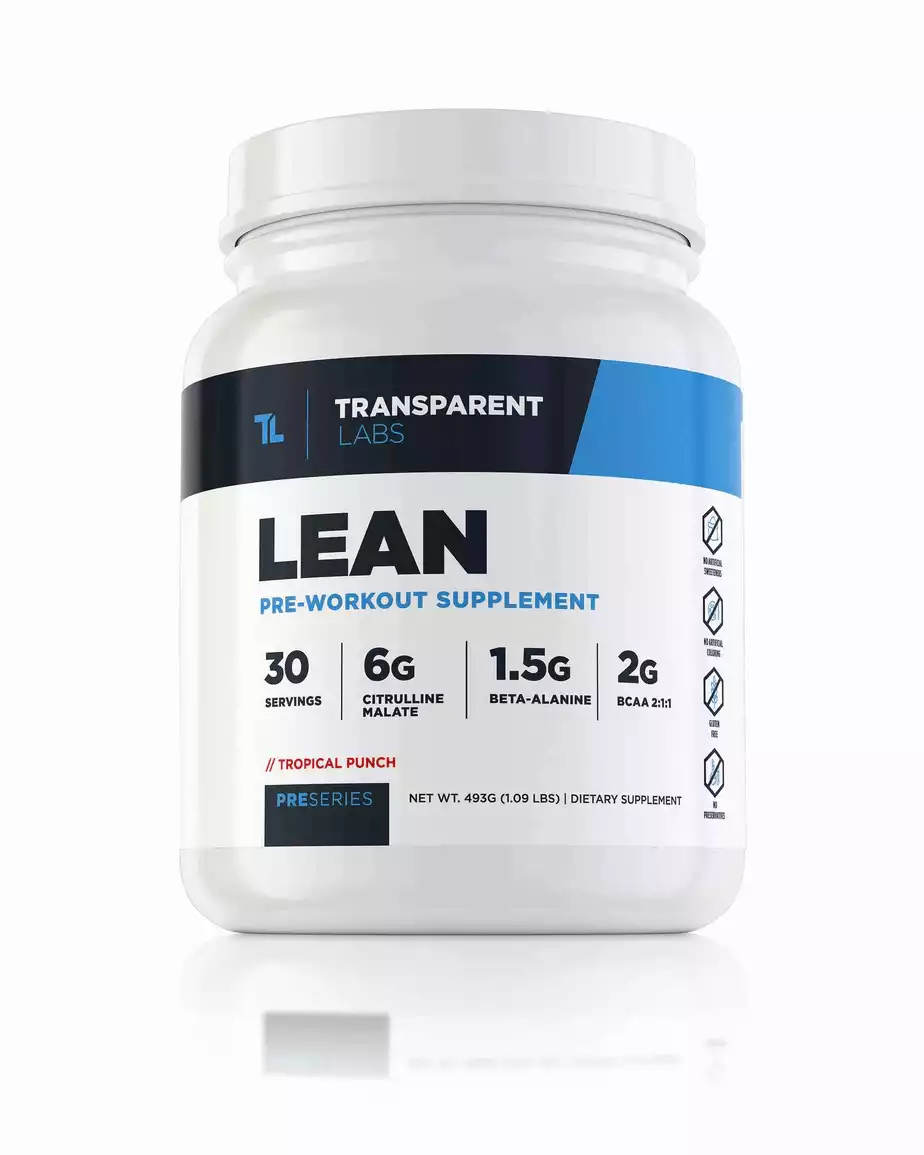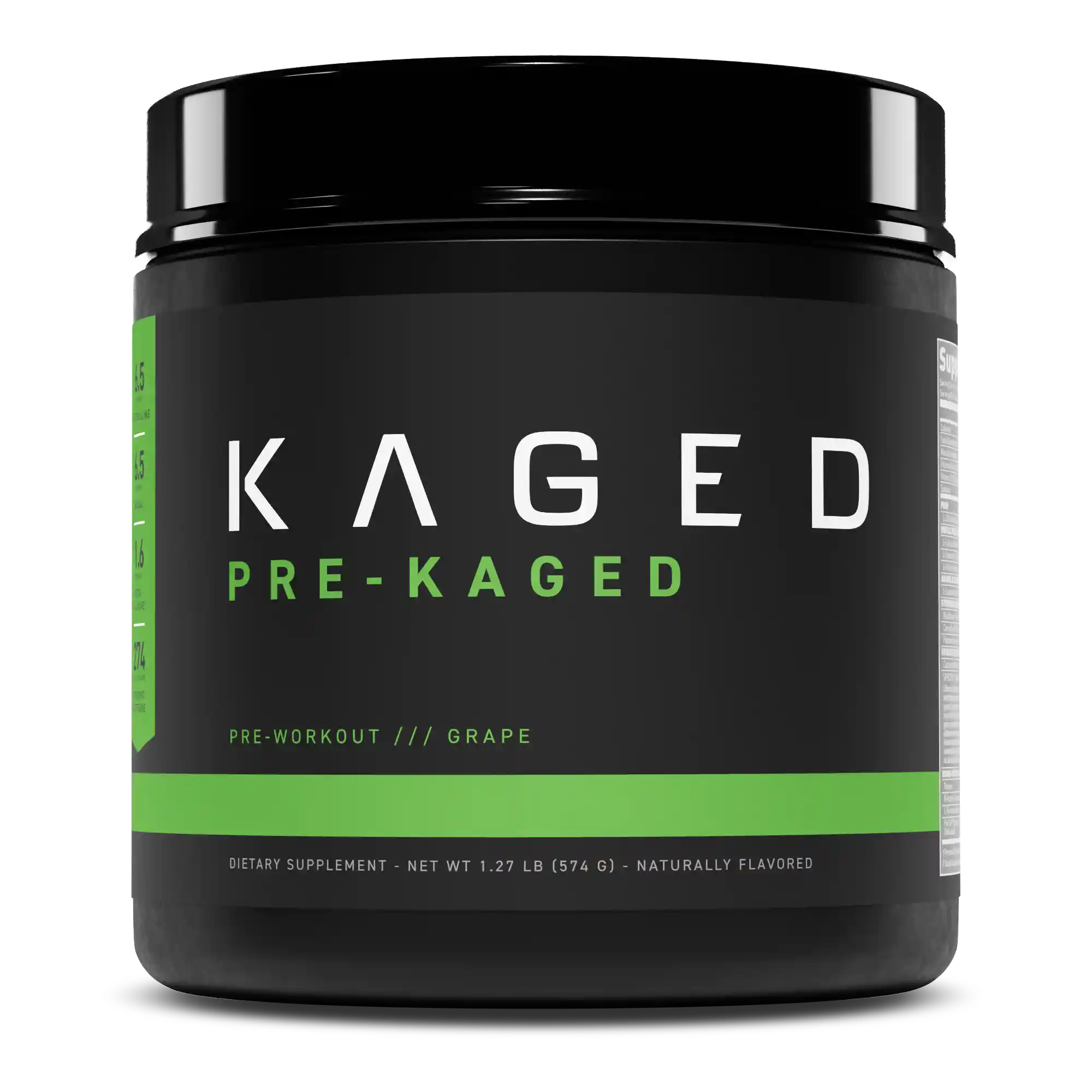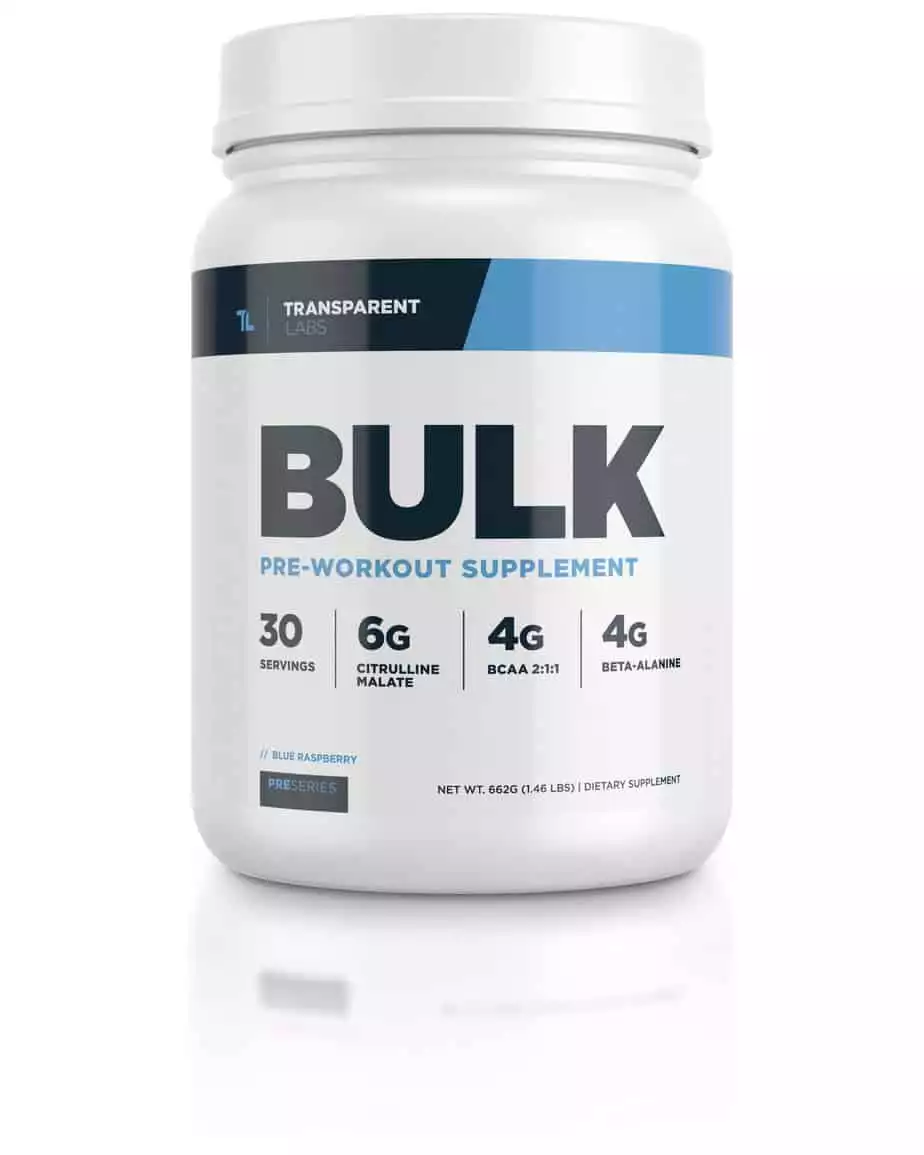Of all the nutritional debates in the fitness world, few things stir controversy and public concern like pre workout supplements. Below you’ll find recommended pre workouts for the safety conscious, a list of ingredients to be wary of, and ingredients that are generally considered safe.
If you just want to see the safest pre-workouts, here they are:
Lean Pre-Workout is a great choice for those seeking all-around nutrition support and a little extra fat-burning help. It's a well-rounded pre-workout that can be good choice for lots of different use cases.
Discount Codes:
LV10 = 10% off your entire order
Pre-Kaged is one of the best "all-around" pre-workouts on the market today. When it comes to delivering proven ingredients at effective dosages, Kaged is a brand that delivers time and time again.
Pre-Kaged supplies pump, energy, and focus without any banned or shady ingredients, making it a great choice for tested athletes or anyone that cares what they put into their body.
Table of Contents
- 1 Why Do People Worry About Pre Workout Supplements?
- 2 Consumers aren’t sure how much of a given ingredient is in a pre workout due to proprietary blends.
- 3 Pre Workout Ingredients to be Careful With
- 4 Safest Pre Workout Ingredients
- 5 Recommended Dosages of Pre Workout Ingredients
- 6 Best Safe Pre Workouts
- 7 Which Pre Workout Brands are Safe?
- 7.1 Is Optimum Nutrition Gold Standard Pre Workout Safe?
- 7.2 Is Legion Pulse Pre Workout Safe?
- 7.3 Is Cellucor C4 Pre Workout Safe?
- 7.4 Is GAT Nitraflex Pre Workout Safe?
- 7.5 Is The Curse Pre Workout Safe?
- 7.6 Is Mr. Hyde Pre Workout Safe?
- 7.7 Is NO Explode Pre Workout Safe?
- 7.8 Is NitroSurge Pre Workout Safe?
- 8 Frequently Asked Questions
- 9 More Pre Workout Reviews
Why Do People Worry About Pre Workout Supplements?
There are two main reasons for this: ingredients and dosages.
Consumers are concerned about dangerous ingredients in pre workout, often stimulants.
- There is a spectrum of pre workout available on the market. Some of them are as generally harmless as a Red Bull, while other pre workouts use barely legal stimulants to jack up the effect (and the price).
- Many of these stimulants have not been approved for human consumption by the FDA, making it illegal to include them in dietary supplements.
- Some of these stimulants are banned from certain sports federations, which adds to the perception that they are not safe.
If you share these concerns, you may also be interested in our list of the best natural pre-workouts.
Consumers aren’t sure how much of a given ingredient is in a pre workout due to proprietary blends.
- Proprietary blends are mixtures of multiple ingredients that do not reveal the amount of each constituent part, although they do disclose the name of each ingredient.
- For example, let’s say Pre Workout A has 1,000 mg of Super Secret Energy Blend. It must disclose the ingredients on the label, such as caffeine, beta alanine, and taurine, but the consumer doesn’t know how much of each ingredient is in a serving of the pre workout.
- They just know they collectively add up to 1,000 mg, but since the ingredients are listed in order, they can make educated estimates about maximum levels of each ingredient.
- In our example there cannot be more than 333 mg of beta alanine or taurine, otherwise they would be listed first (1,000 mg/3 ingredients = 333 mg per ingredient if all are equal). Likewise, it can be determined there is at least 333 mg of caffeine in Super Secret Energy Blend. The blend could be 900 mg of caffeine, 50 mg of beta alanine, and 50 mg taurine.
- The good news is that this is typically done so that supplement companies can advertise their pre workout contains a certain flashy ingredient without revealing that, in fact, there’s barely any of said ingredient in their product. Proprietary blends tend to mask weak points of a product, not hide dangerously high amounts of a certain ingredient. For better or worse, dangerously high amounts of an ingredient would likely be advertised as a selling point in as much detail as possible, including the dosage.
- So if Super Secret Energy Blend did contain 900 mg of caffeine, which would be a dangerous amount, it would probably disclose this in an attempt to be the most “extreme” pre workout on the market.
In review: pre workouts are often perceived as dangerous because of specific ingredients and unknown dosages.
So: if a pre workout clearly labeled its ingredients and all dosages, a consumer could make an informed decision about the safety of the product. This is what leads some people to make their own pre workout.
Pre Workout Ingredients to be Careful With
These are some pre workout ingredients that have not been reviewed by the FDA and may result in a ban from certain sports federations. Again, these typically are stimulants that exist outside of current legal regulations in most countries (i.e. they’re too new to have been banned yet).
Below is a list of ingredients to look out for. If it quickly gets confusing, don’t worry. You don’t need a chemistry degree to avoid risky stimulants in your pre workout.
How to Buy Less Risky Pre Workouts
- Check out our list of the heathiest pre workouts.
- Only buy pre workouts with safe ingredients. Here’s a list of safe pre workout ingredients.
- If you don’t recognize an ingredient, look it up.
- DMAA
- Methylhexanamine, aka 1,3-dimethylamylamine or geranium oil, is a stimulant frequently found in the most extreme pre workouts. It is not WADA compliant and is banned in most sports competition, including powerlifting. That’s why you won’t find it included in our list of the best powerlifting supplements.
- Is DMAA legal in the US?
- Technically, DMAA can legally be sold in the United States, but not for human consumption.
- This is the “loophole” often used by nootropic and other “research chemical” sites that sell DMAA online – they just say “not for human consumption” and sell pure DMAA.
- When DMAA is marketed and sold as an ingredient in a product meant for human consumption (such as dmaa pre workout), it falls under a broader set of laws that prohibit the sale of foods containing additives that are not generally recognized as safe (GRAS). DMAA is not GRAS and therefore cannot be sold in products meant for human consumption.
- Technically, DMAA can legally be sold in the United States, but not for human consumption.
- Is DMAA safe?
- DMAA can constrict blood vessels, which can increase blood pressure. This can lead to short breath, chest pains, and even heart attacks. So, no, it’s not “safe.”
- Is DMAA dangerous?
- There is not a lot of solid research around DMAA. Solid evidence is lacking that it is absolutely dangerous, but there is some anecdotal evidence that it can place undue strain on the respiratory system. There is also anecdotal evidence that it can poison the liver.
- A US Department of Defense study on DMAA concluded: “The existing evidence does not conclusively establish that DMAA-containing substances are causally-associated with adverse medical events. However, a consistent theme among the studies is that DMAA use potentially affects cardiovascular function, just as other sympathomimetic stimulants. Without further rigorous study designs developed to evaluate the safety of DMAA, especially in patients with concomitant use of other substances, co-morbid conditions and high frequency use, the magnitude of the association of DMAA with adverse medical events is uncertain. Widespread use of DMAA-containing products by tens of thousands of Service members – often in combination with other substances – increases the likelihood of observing serious adverse events, even if the overall risk of a DMAA-related event is low, resulting in consequential impact to some Service members and other beneficiaries. DMAA should be further studied to evaluate its safety. Data from the case control study suggest that the frequency and amount of DMAA use and risk of specific [acquired medical events], particularly heat injuries and rhabdomyolysis, need to be examined in greater detail.” (Source)
- DMHA
- 1,5-Dimethylhexylamine aka 1,5 DMHA, Octodrine, Amidrine, 2-amino-5-methylheptane, etc.
- Similar to DMAA and DMHA: not strictly illegal, just not approved for human consumption. Still sold in DMHA pre workout supplements in 2020.
- Illegal in most sports, not WADA compliant.
- DMBA
- 1,3-dimethylbutylamine, aka 1,3 DMBA (noticing a pattern?), is another synthetic stimulant often included in the most extreme pre workouts. It is not WADA compliant and is banned in most sports competition, including powerlifting.
- Similar to 1,3 DMAA, DMBA is not permitted to be sold in products meant for human consumption in the US, but some manufacturers do it anyway. It is less common than DMAA or DMHA in pre workouts.
- Ephedrine
- Ephedrine was one of the original fringe stimulants that became extremely popular in weight loss supplements as an appetite suppressant.
- It was banned by the FDA in 2004 and is only legally sold in certain medications, such as asthma treatment.
- It is still seen in some pre workouts, but is less common today.
- Phenethylamines/Phenylethylamines
- 2-aminoisoheptane or Aconitum kusnezoffii have been shown to be covers for the inclusion of a variety of fringe stimulants like 1,3 DMAA, 1,4 DMAA, DMHA, DMBA.
- The list goes on…
- The Operation Supplement Safety list published by the US Department of Defense is a fairly comprehensive list of key ingredients and their analogues to be wary of.
Safest Pre Workout Ingredients
Below are common pre workout ingredients that are well-tested and FDA approved for human consumption in recommended doses.
- Caffeine
- Variants like anhydrous, di-caffeine malate, caffeine citric acid blend, etc. are OK too.
- Creatine
- Common variants: monohydrate, hydrochloride (HCL)
- Beta-alanine
- Citrulline malate
- BCAA (branched chain amino acids)
- Betaine (aka trimethylglycine)
- L-theanine
- L-tyrosine
- Taurine
This is not an exhaustive list, but these are some of the more common ingredients included in pre workouts that are considered reasonably safe.
Recommended Dosages of Pre Workout Ingredients
The other tricky area when buying pre workouts is that many are underdosed on certain ingredients. So even if they use safe, proven ingredients, they might not be using enough of them. This is one way some companies try to make more money.
Here are the recommended dosages of the most common pre workout ingredients:
- Caffeine: 200 mg – 300 mg
- Creatine Monohydrate: 5 grams
- or Creatine HCL: 1.5 grams
- Beta-alanine: 3-4 grams
- L-Citrulline: 6-8 grams
Best Safe Pre Workouts
Pre-Kaged is one of the best "all-around" pre-workouts on the market today. When it comes to delivering proven ingredients at effective dosages, Kaged is a brand that delivers time and time again.
Pre-Kaged supplies pump, energy, and focus without any banned or shady ingredients, making it a great choice for tested athletes or anyone that cares what they put into their body.
With just over 200 mg of caffeine, BCAAs, Vitamin D3, and Zinc, BULK is a great choice if you're looking for a normal amount of caffeine + extra nutritional support.
Discount codes:
LV10 = 10% off Transparent Labs
Below are some of the best pre workouts that do not use any illegal or shady ingredients, include recommended (or close) doses of key ingredients, and are fairly priced.
All in all, Kaged Muscle’s Pre-Kaged, Transparent Labs’ BULK, Citadel Nutrition’s Tier 1+ and Legion Pulse are some of the only pre-workouts I can 100% say are no BS, no filler, and fully dosed. Legion also has a caffeine-free pre-workout version.
Both Kaged and Transparent Labs appear on our lists of the best pre-workouts for teens and the best pre-workouts for athletes because of their dedication to clean pre-workout ingredients. They also made it onto our coveted list of the best pre-workout supplements because both are so easy to recommend to a a wide audience.
Personally I use Legion Athletic’s Pulse and really enjoy it – plus I only need 1 scoop which brings the serving cost down to $1 (and I use a decent amount of caffeine, like 600 mg+ a day).
- Citadel Nutrition – Tier 1+ Pre Workout (Excellent Product, Best Value, $1/serving)
- Caffeine: 300 mg (high dose)
- Creatine Monohydrate: 5 grams (100% recommended dose)
- Beta-Alanine: 3.2 grams (80% recommended dose)
- L-Tyrosine: 3 grams (anecdotally enough, recommended doses vary)
- Legion Athletics – Pulse Pre Workout (Excellent Product, $2/serving)
- Strong enough that I take 1 scoop with good results, bringing cost down to $1/serving.
- Caffeine: 350 mg (high dose)
- L-Citrulline DL-Malate 2:1: 8 grams (100% recommended dose)
- Beta-Alanine: 3.6 grams (90% recommended dose)
- Betaine Anhydrous: 2.5 grams (83% recommended dose)
- L-Theanine: 350 mg (plenty, recommended doses vary)
This does not mean that every other pre workout is shady or should not be trusted. I just think these two products do a great job of providing a high quality, transparent, and reasonably priced product.
Which Pre Workout Brands are Safe?
Is Optimum Nutrition Gold Standard Pre Workout Safe?
Yes, ON Gold Standard Pre Workout is safe. It is a little weak/underdosed, but is a pretty good price point around $20. It doesn’t contain any illegal or banned substances. Optimum Nutrition is a reputable company.
Is Legion Pulse Pre Workout Safe?
Yes, Legion Pulse Pre Workout is safe. It is a strong preworkout and contains no banned or illegal substances. Legion Athletics is a reputable company with no prior controversies.
Is Cellucor C4 Pre Workout Safe?
Yes, although the Extreme version comes with a minor disclaimer.
Cellucor’s C4 comes in many different versions: Original, Ultimate, Sport, Ripped, and Extreme.
C4 Extreme contains synephrine HCL (aka bitter orange), which is banned by the NCAA. It’s chemically similar to ephedrine, but weaker. It is deemed “likely safe” for children and adults by WebMD, so unless you are competing in the NCAA it’s probably fine for you to take this preworkout. I cannot find any documentation suggesting it is banned by the IPF, USAPL, or other powerlifting federations.
All other Cellucor C4 preworkouts are completely fine.
Is GAT Nitraflex Pre Workout Safe?
It’s very strong and shouldn’t be used by those sensitive to caffeine, but it doesn’t contain any ingredients known to be dangerous or illegal.
GAT Nitraflex used to contain DMAA but no longer does. It’s current formulation contains nootropics like DMAE-Bitartrate that claim to boost focus.
Is The Curse Pre Workout Safe?
Yep – all good here. The Curse is okay.
Is Mr. Hyde Pre Workout Safe?
Well, it’s complicated. But yes, mostly.
Mr. Hyde used to contain picamilon, which was declared by the FDA to be unsafe as a dietary supplement. This ingredient has since been removed and is no longer in Mr. Hyde pre workout.
NitroX contains 420mg of caffeine in a dose, which is extremely high. It also contains Yohimbine, which is legal in the US but can cause anxiety, increased heart rate, gastrointestinal distress, and high blood pressure. It is banned in Canada, Australia, and the UK, but not the USA.
Signature Series contains around 210mg of caffeine, which is much more reasonable. It contains no Yohimbe.
NitroX Lower Stimulant unsurprisingly contains reasonable amounts of caffeine (just 100mg) and no Yohimbe.
So, yes, Mr. Hyde is generally safe but is very intense and shouldn’t be used by first timers or those sensitive to caffeine. Also be aware of Yohimbine and if that is something you’re willing to take.
Is NO Explode Pre Workout Safe?
Yep. NO Explode has a lot of caffeine, but otherwise is fine.
Is NitroSurge Pre Workout Safe?
NitroSurge is safe. It does contain theobromine, which can cause sweating, trembling, and severe headaches around does of 800mg to 1,500mg, but NitroSurge contains 50mg.
Frequently Asked Questions
Generally speaking, yes, pre workout supplements are safe.
The more hardcore pre workout supplements are more likely to have stimulants that can cause some uncomfortable side effects (e.g. anxiety, cold sweats, heart racing), but even these ingredients are not likely to cause long term harm. These ingredients are listed on the page to help you be able to identify them.
Pre workout supplement ingredients that are more likely to cause unwanted side effects include the following:
Alpha Yohimbine
DMAA
DMHA
High doses of caffeine
Some of the negative side effects that can come from these ingredients include anxiety, cold sweats, chills, heart racing, and depressed mood after ingestion.
The effects of a pre workout supplement are not always apparent just by looking at the label, though the label can definitely provide a lot of useful information when making a purchase decision.
Aside from looking at the label, it is advisable to read reviews on YouTube or elsewhere to learn more about the experience of others. This is often the most useful information you can gather apart from doing research on the individual ingredients.
I’d also recommend to stay away from labels that use proprietary blends that make it impossible to know the exact dosages of key ingredients. Supplements that use proprietary blends are not inherently bad or unsafe, but until you’ve gained enough experience to get a feel for pre workouts, it’s probably advisable to leave “prop blends” alone.
More Pre Workout Reviews
Check out more pre workout reviews below!
- Best Pre Workouts
- Strongest Pre Workouts
- Best DMAA Pre Workout
- Best DMHA Pre Workout
- Best Pre Workout for PUMPS
- Safe Pre Workouts
- Best Caffeine Free Pre Workout (Stim Free Pre Workout)
- Best Pre Workout for Beginners
- Best Pre Workout for Women
- Best Pre Workout without Creatine
- Best Pre Workout without Beta Alanine


